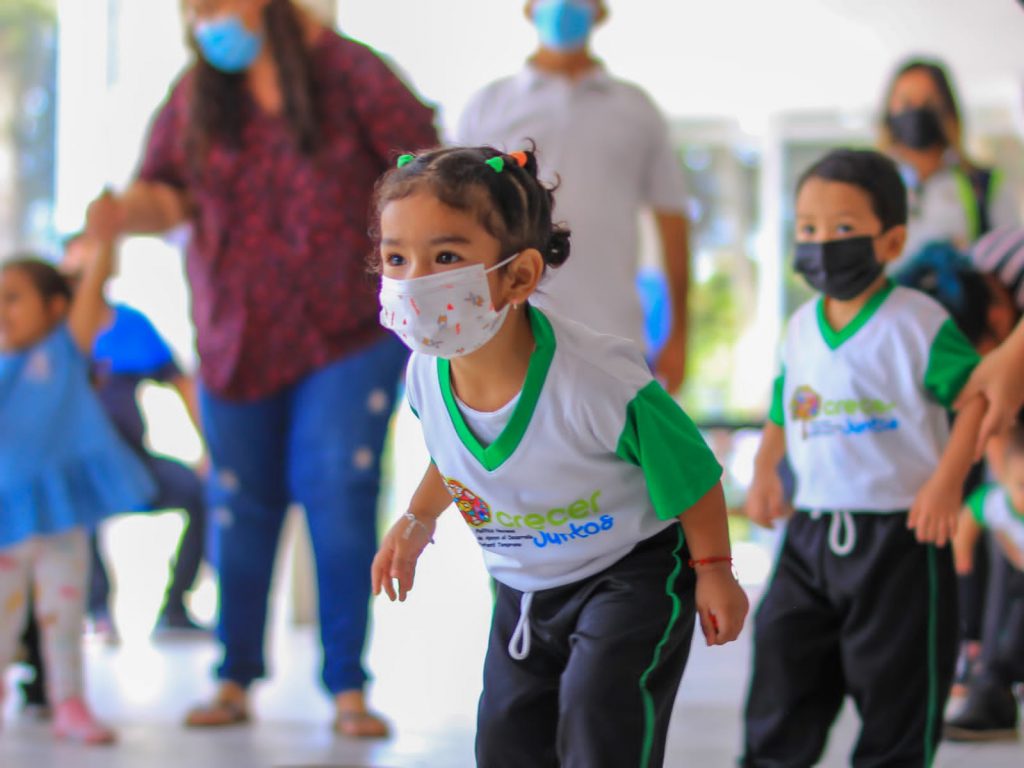Central America
Early childhood is a high priority for the Salvadoran government in the area of education

October 3 |
The public investment contemplated in the draft General State Budget for 2024 amounts to $1,790.5 million, and includes a strong commitment to the education system in general, and specifically, to the protection and comprehensive care of early childhood and adolescence, according to figures presented by the Ministry of Finance.
As part of the emblematic projects in public investment, the Government of President Nayib Bukele will allocate $245 million for the early childhood programs Crecer y Aprender Juntos, and Nacer, Aprender y Crecer, which will be executed by the Ministries of Education and Health.
All the early childhood work has been led by the First Lady of the Republic, Gabriela de Bukele, with the support of public institutions, with the purpose of settling the historical debts left by the ARENA and FMLN parties, which governed for 30 years.
As part of the work in early childhood, the first lady met last week at the Presidential House with Afshan Khan, United Nations undersecretary and coordinator of the Global Movement for the Promotion of Nutrition, to whom she presented the work of the Government of President Nayib Bukele in favor of this segment of the population.
At the end of the meeting, Khan highlighted the work done by the Government and the First Lady for early childhood and remarked that El Salvador is one of the few countries that invest in this area. “The program of the First Lady, Gabriela de Bukele, is one of the best child development programs I have ever seen,” said the UN official during her visit.
As part of the strategic bet, next year’s state budget also allocates $140 million for the educational reform Mi Nueva Escuela, in addition to $16 million for the improvement of educational environments and $75 million for the program Creciendo Saludables Juntos, whose main objective is the integral development of early childhood.
The educational reform Mi Nueva Escuela, announced by the President of the Republic in September 2022, is part of the government’s strategy to transform the public education system that was abandoned by previous governments. The change of school curricula and textbooks, as well as the incorporation of technology and the construction and reconstruction of educational spaces, nutrition and health are part of the axes of this reform.
The sociologist and teacher Mauricio Rodríguez considers that the Ministry of Finance has presented a “balanced” state budget project, with “strategic investment lines” to solve the needs in each of the social areas, including education in the public sector.
“In the area of education there is a strong component with respect to what we know as early childhood”, said the analyst, and recalled that, together with the investment component, the Government is already implementing the Nacer con Cariño Law and the Crecer Juntos (Grow Together) Law. Both regulations were proposed by the Executive and approved by the Legislative Assembly.
“It makes sense that the general State budget be oriented more towards these areas, to lay the foundations for a country with people of a different type of preparation. What previous governments did was to strengthen the intermediate levels [of the educational system] and forgot about the base [early childhood],” the teacher stated.
In public investment, the budget also allocates $69 million for the integrated health program, to continue improving care at all levels of the public system; and $257 million for the purchase of medicines, medical supplies and vaccines.
Also, $138 million was budgeted for the execution of municipal infrastructure works through the National Directorate of Municipal Works (DOM) and $182 million for the Los Chorros highway viaduct and widening project. ANDA will also receive $26.7 million to execute the water sector resiliency program in prioritized areas.
Central America
Guatemala President Says Starlink Terminal Found Inside Prison

Guatemalan President Bernardo Arévalo revealed on Tuesday that a Starlink terminal was discovered inside a prison in the country, highlighting corruption and the illegal introduction of advanced communication technology into the penitentiary system.
Arévalo did not specify which prison the device was found in but stressed that Starlink’s ability to connect directly to low-orbit satellites makes it particularly difficult to disrupt, posing a serious security risk.
The disclosure was made during a press conference attended by Interior Minister Marco Antonio Villeda and Defense Minister Henry Sáenz.
On January 6, specialized units of Guatemala’s National Civil Police (PNC), members of the Army and prison security personnel carried out Operation Sentinel at the Renovación 1 Maximum Security Prison for Men, located in Escuintla. According to the Interior Ministry, the operation aimed to reduce criminal activity, prevent illicit acts and stop the trafficking of prohibited items inside the prison.
During the operation, authorities also dismantled businesses operating near several prisons after detecting routers that were allegedly used to redirect internet signals into penitentiary facilities, according to local outlet Emisoras Unidas.
Tensions escalated further over the weekend of January 17 and 18, when inmates affiliated with gangs staged riots in three prisons. During the unrest, they took prison guards and a psychologist hostage, demanding extra-large beds, air conditioning, transfers to other facilities and access to the internet.
Central America
Guatemala Police Arrest Prison Guard Caught in the Act of Extortion

Guatemala’s National Civil Police (PNC) arrested a suspected extortionist in the act during an operation carried out in the department of Quiché, authorities reported.
According to the police report, the arrest took place in Zone 1 of Santa Cruz del Quiché after officers responded to a citizen complaint. Agents from Precinct 71 identified the suspect as Encarnación “N”, 41, who was serving as a guard in the Guatemalan Penitentiary System.
The suspect was caught while attempting to collect a package simulating an extortion payment totaling 25,000 quetzales. Police intervened at the precise moment the money was being handed over, allowing authorities to document the crime in flagrante delicto.
Following the operation, the detainee was placed at the disposal of the competent courts to face criminal proceedings.
The PNC emphasized that such operations aim to dismantle criminal structures involved in extortion, regardless of whether those implicated are linked to state institutions, and urged the public to continue reporting these crimes through confidential channels.
Central America
Honduras swears in conservative president Asfura after disputed election

Conservative politician Nasry Asfura assumed the presidency of Honduras on Tuesday with an agenda closely aligned with the United States, a shift that could strain the country’s relationship with China as he seeks to confront the economic and security challenges facing the poorest and most violent nation in Central America.
Asfura’s rise to power, backed by U.S. President Donald Trump, marks the end of four years of left-wing rule and secures Trump another regional ally amid the advance of conservative governments in Chile, Bolivia, Peru, and Argentina.
The 67-year-old former mayor and construction businessman was sworn in during an austere ceremony at the National Congress, following a tightly contested election marred by opposition allegations of fraud and Trump’s threat to cut U.S. aid if his preferred candidate did not prevail.
Grateful for Washington’s support, Asfura—who is of Palestinian descent—traveled to the United States to meet with Secretary of State Marco Rubio, before visiting Israeli Prime Minister Benjamin Netanyahu.
“We need to strengthen relations with our most important trading partner,” Asfura said after being declared the winner of the November 30 election by a narrow margin, following a tense vote count that lasted just over three weeks.
-

 Central America3 days ago
Central America3 days agoGuatemala seizes over a ton of cocaine hidden in flour at Pacific port
-

 International5 days ago
International5 days agoTrump-Era Defense Plan Prioritizes Border Security and Scales Back Global Commitments
-

 International5 days ago
International5 days agoBogotá and Quito Seek Dialogue After Tariffs and Power Cut Escalate Tensions
-

 International4 days ago
International4 days agoDelcy Rodríguez seeks political agreements after Maduro’s ouster
-

 International3 days ago
International3 days agoHistoric snowstorm paralyzes Toronto after 60 centimeters of snow
-

 International3 days ago
International3 days agoSpain’s irregular migrant population rises to 840,000, study finds
-

 International4 days ago
International4 days agoFederal immigration agents kill man in Minneapolis, sparking protests and outrage
-

 Central America2 days ago
Central America2 days agoGuatemala Police Arrest Prison Guard Caught in the Act of Extortion
-

 Central America2 days ago
Central America2 days agoHonduras swears in conservative president Asfura after disputed election
-

 Central America2 days ago
Central America2 days agoBukele leads public trust rankings as UCA survey highlights gains in security
-

 International2 days ago
International2 days agoWinter Storm Fern Leaves 30 Dead and Over One Million Without Power Across the U.S.
-

 Sin categoría2 days ago
Sin categoría2 days agoEight Killed in Series of Armed Attacks in Ecuador’s Manabí Province
-

 International3 days ago
International3 days agoRights group says nearly 6,000 killed in Iran protest crackdown
-

 International2 days ago
International2 days agoDoomsday clock moves to 85 seconds before midnight amid rising global risks
-

 International12 hours ago
International12 hours agoFootball Fan Killed in Clashes After Colombian League Match
-

 International3 days ago
International3 days agoVenezuela frees at least 80 political prisoners, NGO says
-

 International2 days ago
International2 days agoSpain approves plan to regularize up to 500,000 migrants in Historic Shift
-

 Sin categoría2 days ago
Sin categoría2 days agoEl Salvador Launches Fourth Year of Ocean Mission to Protect Marine Ecosystems
-

 International13 hours ago
International13 hours agoRubio Says U.S. Could Participate in Follow-Up Russia-Ukraine Talks
-

 International3 days ago
International3 days agoEU launches new probe into X over AI-generated fake nude images
-

 International12 hours ago
International12 hours agoMissing Spanish Sailor Rescued After 11 Days Adrift in Mediterranean
-

 Central America12 hours ago
Central America12 hours agoGuatemala President Says Starlink Terminal Found Inside Prison
-

 International3 days ago
International3 days agoSevere winter storm grips U.S., leaves multiple dead as extreme cold persists
-

 International3 days ago
International3 days agoFrance debates ban on social media for children under 15








































































































